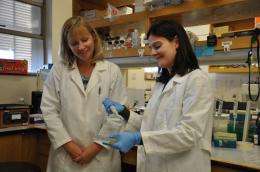New target for Alzheimer's drugs

(Medical Xpress) -- Biomedical scientists at the University of California, Riverside have identified a new link between a protein called beta-arrestin and short-term memory that could open new doors for the therapeutic treatment of neurological disorders, particularly Alzheimer’s disease.
Beta-arrestin is expressed in various cells of the body, including cells of the hippocampus, the region of the brain that is involved in learning and the formation of short-term memories. Beta-arrestin, the absence of which impairs normal learning in mice, is one of many “scaffolding proteins” — proteins that support the connections between neurons in the brain.
As our brain develops, new connections called synapses are formed between neurons. In the hippocampus, the formation of synapses is a continuous process. As we learn something new, new connections are formed and some old ones become stronger through a process known as long-term potentiation (LTP). But because brains have only a limited capacity, other old connections must disassemble through a process known as long-term depression (LTD) in order for new synapses to form.
The researchers report online last week in the Proceedings of the National Academy of Sciences that beta-arrestin plays an important role in the plasticity of synaptic connections and LTD by regulating the “actin cytoskeleton,” a dynamic filamentous network of proteins that forms the “backbone” of neurons and is involved in forming new and disassembling old synaptic connections.
“In some pathological conditions such as Alzheimer’s disease, loss of the old synaptic connections far exceeds the formation of new ones, resulting in overall loss of synapses and short-term memory loss,” said Iryna M. Ethell, an associate professor of biomedical sciences and the lead author of the research paper. “Our work, done on mice, shows that if beta-arrestin is removed from neurons, this loss of synapses is prevented. But we also know that beta-arrestin is required for normal learning and memory; so a fine balance needs to be established. This balance could be easily achieved by pharmaceutical drugs in the future.”
This is the first time researchers anywhere have linked beta-arrestin to Alzheimer’s and learning/memory.
Ethell explained that beta-arrestin can be visualized as energy supplied to a puppeteer (actin cytoskeleton) controlling the strings of the puppets (inter-neuronal connections). For normal learning to take place, the puppeteer needs to move the strings in a specific order. But in patients with Alzheimer’s, this supply of energy over-activates and the strings are pulled in a disorderly fashion that results in the strings being broken (loss of synapses) and the puppets collapsing. While the removal of beta-arrestin would prevent this collapse, a complete loss of beta-arrestin would mean no movement of the puppets at all (that is, no learning in the brain), which is equally undesirable.
“A selective tuning of beta-arrestin activity is therefore necessary to partially reduce synapse disassembly,” said Crystal G. Pontrello, the first author of the research paper and a postdoctoral researcher in Ethell’s lab. “What you want, ideally, is the elimination of only some unused old synaptic connections so that there is room to make new connections.”
















